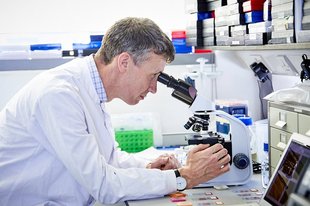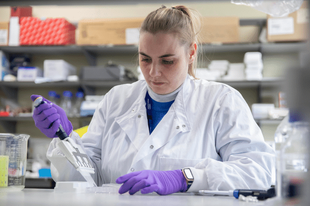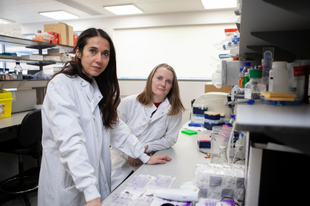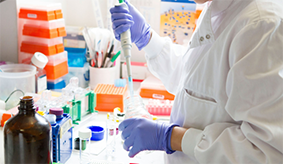The Researchers Revolutionising Cancer Treatments
From reducing recurrence to digging into our DNA to raise survival rates, here’s how four of our medical experts are building better care pathways for patients at the Ovarian Cancer Action Research Centre.

Iain McNeish at the Ovarian Cancer Action Research Centre
A little less conversation between cancer cells
Around 70 percent of patients diagnosed with ovarian cancer will have a recurrence. But why? That’s what the Director of the OCA Research Centre, Professor Iain McNeish is investigating.
He believes that we can halt tumor growth by understanding the communication between cancerous and non- cancerous cells. By disrupting this connection, he’s hopeful the chance of the disease returning after surgery will be significantly reduced.

Dr Anke Nijhuis at the Ovarian Cancer Action Research Centre
The anti-cancer agent ripping through drug resistance
Many ovarian cancer patients are treated with a type of drug called a PARP inhibitor. This special substance breaks down the cancer making it harder to repair itself.
Dr. Anke Nijhuis realised that ovarian cancer was becoming wise to this treatment and resistant to the drug. Instead, she and her team are exploring a tag-team drug combo using an experimental anticancer agent called indisulam.
With this power combo, they’re hopeful they will uncover a way to make current treatment plans more effective for even more people.

Dr Christina Fotopoulou and Dr Paula Cunnea
Embracing our differences to produce personalised treatments
Professor Christina Fotopoulou is dedicated to improving care and prolonging life for her patients. Together with Dr. Paula Cunnea, Christina has discovered that often when recommending treatments, doctors are only using one cancer sample. But their investigations have revealed that
there is a vast difference between samples within individuals. By digging into these variables, Christina, Paula and her team can design more personalised treatments for future

Ovarian Cancer Action Research Centre
Gene genie: Digging into our DNA to raise survival rates
Dr. Marco Di Antonio is a man who definitely subscribes to the ‘one size-doesn’t fit all’ ethos, especially when it comes to cancer treatments. He was curious about whether our DNA could be impacting the effectiveness of chemotherapy. His novel laboratory technique using ultraviolet light digs into our chemical structures revealing how they differ in our DNA. This new tool could uncover which genes are crucial for controlling drug resistance, restoring effectiveness to existing therapies and improving survival rates for good.
Have these science stories sparked your interest in our research programmes?
Discover more of our ongoing projects on our website at ovarian.org.uk/research